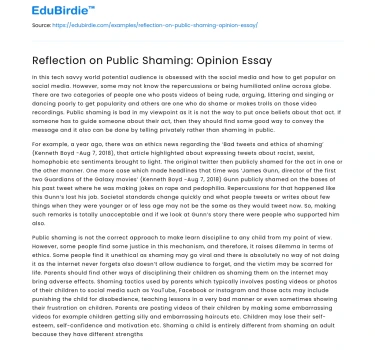Introduction
In the age of digital interconnectedness, public shaming has transcended traditional boundaries, evolving into a potent tool for social sanction. Historically rooted in societal correction, public shaming's resurgence via social media platforms has sparked intense debates about its ethical implications and efficacy. As a mechanism of social control, public shaming can serve as a deterrent, encouraging compliance with societal norms. However, its deployment in the digital realm raises concerns about justice, privacy, and the potential for disproportionate harm. This essay delves into the complexities of public shaming, analyzing its role and impact in contemporary society. It explores the dual nature of public shaming as both a social corrective and a potential source of harm, examines notable instances of digital shaming, and considers counter-arguments to highlight the nuanced balance between accountability and humanity.
The Dual Nature of Public Shaming
Public shaming, traditionally a communal exercise, has evolved into a digital phenomenon with far-reaching implications. On one hand, it serves as a mechanism for upholding societal norms by holding individuals accountable for their actions. Sociologist Erving Goffman described public shaming as a "social control" tool, emphasizing its role in reinforcing communal values. This aspect of shaming can be beneficial in addressing issues that legal systems may overlook, such as ethical breaches or social injustices. For instance, the #MeToo movement leveraged public shaming to highlight systemic sexual harassment, ultimately fostering significant cultural and legal changes. By exposing wrongdoing, public shaming can catalyze discussions and reforms, holding powerful individuals and institutions accountable in ways that traditional mechanisms may not.
Save your time!
We can take care of your essay
- Proper editing and formatting
- Free revision, title page, and bibliography
- Flexible prices and money-back guarantee
Conversely, the digital age has amplified the potential harm of public shaming, often resulting in severe consequences for the shamed individuals. The rapid dissemination of information through social media can lead to disproportionate punishment, where the severity of the public backlash far exceeds the original transgression. Jon Ronson, in his book So You've Been Publicly Shamed, illustrates the devastating personal and professional impacts on those targeted by online mobs. The permanence of digital records means that those shamed may endure long-term reputational damage, regardless of any subsequent exoneration or apology. This raises ethical questions about proportionality, the right to privacy, and the potential for mob justice, highlighting the need for a more measured approach to public shaming in the digital era.
Real-Life Cases and Ethical Implications
Several high-profile cases illustrate the profound impact of public shaming in the digital age. The case of Justine Sacco, a public relations executive, who, in 2013, posted a tweet that was perceived as racially insensitive, serves as a cautionary tale. The tweet, intended as a satirical comment, instead led to a social media frenzy while Sacco was on a transatlantic flight, culminating in her losing her job and facing global condemnation. This incident underscores the ethical challenges associated with digital shaming, where context is often lost in the rapid dissemination of information. The disproportionate response highlights the potential for social media to become a platform for mob justice, where the punishment is meted out by an anonymous collective rather than a judicial body.
Moreover, public shaming can perpetuate a culture of fear, discouraging open dialogue and stifling diverse perspectives. The fear of being publicly shamed may lead individuals to self-censor, undermining the very foundation of free speech and democratic discourse. This chilling effect is particularly pronounced in academic and professional settings, where individuals may avoid controversial topics or dissenting opinions to safeguard their reputations. As philosopher Michel Foucault posited, the power dynamics inherent in public shaming reflect broader societal structures, where the threat of humiliation is wielded as a tool of control. It is essential, therefore, to balance the pursuit of accountability with the protection of individual dignity and freedom of expression.
Counter-Arguments and the Need for Balance
Critics of public shaming argue that it constitutes a form of extrajudicial punishment that undermines due process. Unlike legal proceedings, which are bound by principles of fairness and proportionality, public shaming often lacks safeguards to prevent abuse and ensure justice. The anonymity afforded by the internet can embolden individuals to partake in shaming without accountability, exacerbating the potential for harm. Furthermore, the permanence of digital records means that the consequences of shaming can extend indefinitely, leaving individuals with little recourse to rehabilitate their reputations.
However, proponents contend that public shaming can serve as a necessary corrective in instances where traditional legal mechanisms fall short. In cases of systemic injustice or abuse of power, public shaming can amplify marginalized voices and catalyze societal change. It can also serve as a deterrent, encouraging individuals and institutions to adhere to ethical standards. The key, therefore, lies in striking a balance between leveraging the accountability potential of public shaming and mitigating its potential for harm. This necessitates a critical examination of the contexts in which public shaming is employed, ensuring that it is used judiciously and ethically.
Conclusion
In conclusion, public shaming in the digital age presents a complex interplay between accountability and ethical considerations. While it can serve as a powerful tool for social justice, its potential for harm necessitates careful navigation. As society grapples with the implications of digital shaming, it is imperative to foster a culture that prioritizes empathy, proportionality, and respect for individual dignity. This involves recognizing the limits of public shaming and advocating for alternative mechanisms of accountability that uphold the principles of justice and humanity. By doing so, society can harness the positive potential of public shaming while safeguarding against its excesses, ensuring a more equitable and compassionate social discourse.






 Stuck on your essay?
Stuck on your essay?

